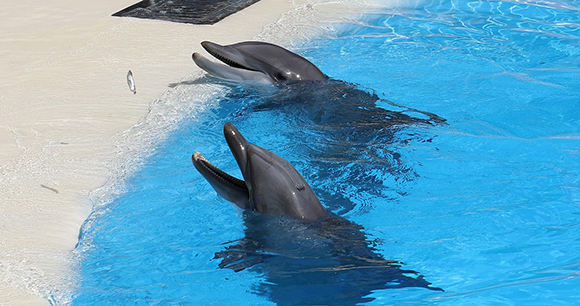
Update: Dolphinaris announced on Feb. 5 that it would temporarily close while an “outside" panel of veterinarians, pathologists, water quality experts and animal behavior specialists evaluates the dolphinarium following the death of a fourth dolphin in less than two years. AWI urges facility operators to assemble a truly external team of specialists and be transparent about the selection process.
Washington, DC—The Animal Welfare Institute (AWI) is urging the Animal and Plant Health Inspection Service (APHIS) of the USDA to conduct a full investigation of Dolphinaris in Arizona after a fourth bottlenose dolphin died there in less than two years. On Thursday, the dolphinarium near Scottsdale reported that it had euthanized the 22-year-old Kai’nalu after his health had declined.
“We are writing as a matter of urgency to request that the Animal and Plant Health Inspection Service (APHIS) conduct an immediate inspection of Dolphinaris in Arizona to review the animals’ clinical records and necropsy reports,” Dr. Naomi Rose, marine mammal biologist for AWI, wrote in a letter Friday to APHIS.
Dr. Rose also requested that an external team, including an expert APHIS veterinarian and an expert NGO veterinarian, as well as other external specialists with whom Dolphinaris is working, conduct an investigation into the conditions at Dolphinaris. She raised concerns about the risks to dolphins posed by valley fever—caused by the fungus Coccidioides—and other aerosolized pathogens that are present in a desert environment.
“We strongly urge that the remaining four dolphins at this facility be confiscated and returned to their facilities of origin,” Dr. Rose wrote.
She also issued the following media statement:
“The Animal Welfare Institute and several other animal protection organizations opposed the construction of a dolphinarium in the Arizona desert from the outset, but despite our protests, Dolphinaris opened in October 2016. With every dolphin death—Bodie in September 2017; Alia in May 2018; Khloe in December 2018; and now Kai’nalu on Thursday—we have asked for transparency, for the release of necropsy reports, for answers. Our concern has always been twofold: First, dolphins don’t belong in the desert. The environment is simply inappropriate and inhospitable to these ocean creatures. Second, valley fever, a fungal infection, is prevalent in Arizona and we have expressed concern about the ability of the dolphins to handle this and other aerosolized pathogens.
Dolphinaris told the public that Bodie, a young male, died of a “rare muscle disease,” but then told the US government agency responsible for administering the Animal Welfare Act that he died of a fungal infection. This raises the possibility that valley fever or other fungal infections such as mucormycosis have indeed affected these dolphins. When Khloe died, the facility claimed she had a chronic illness. If this is true, we question why she was subjected to three moves in less than four years, the last to Dolphinaris. It is also inexcusable for her to have been used in swim-with encounters if she had a chronic condition. If she did not become sick until she came to Arizona, the concern again is that fungal pathogens may be implicated. The onus is firmly on Dolphinaris at this point to provide veterinary evidence to the contrary.
Dolphinaris claims it is working with a ‘team of external experts’ to determine a course of action to ensure ‘our dolphin family remains healthy’ and their ‘high quality of life’ is maintained. It is highly likely that members of this team are from the public display industry, which is hardly external. An investigation is absolutely imperative with this fourth death, but the team should genuinely be external, with veterinarians from the government and the animal protection community participating. At this point, with the loss of half the facility‘s dolphins since it opened less than three years ago, Dolphinaris must demonstrate that its dolphins have any quality of life at all, let alone a high one.”
Margie Fishman, (202) 446-2128, [email protected]